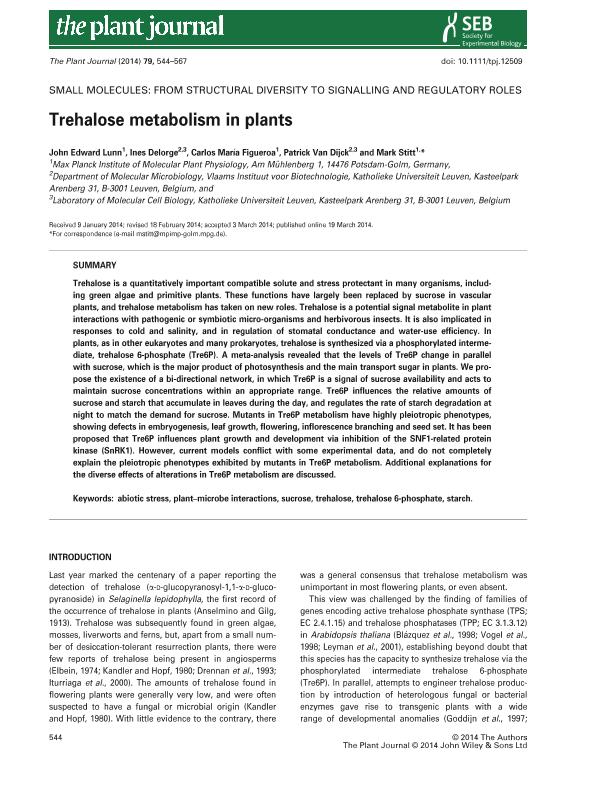Mostrar el registro sencillo del ítem
dc.contributor.author
Lunn, John Edward
dc.contributor.author
Delorge, Ines
dc.contributor.author
Figueroa, Carlos Maria

dc.contributor.author
Van Dijck, Patrick
dc.contributor.author
Stitt, Mark
dc.date.available
2017-02-24T19:06:56Z
dc.date.issued
2014-08
dc.identifier.citation
Lunn, John Edward; Delorge, Ines; Figueroa, Carlos Maria; Van Dijck, Patrick; Stitt, Mark; Trehalose metabolism in plants; Wiley Blackwell Publishing, Inc; The Plant Journal; 79; 4; 8-2014; 544-567
dc.identifier.issn
0960-7412
dc.identifier.uri
http://hdl.handle.net/11336/13386
dc.description.abstract
Trehalose is a quantitatively important compatible solute and stress protectant in many organisms, including green algae and primitive plants. These functions have largely been replaced by sucrose in vascular plants, and trehalose metabolism has taken on new roles. Trehalose is a potential signal metabolite in plant interactions with pathogenic or symbiotic micro-organisms and herbivorous insects. It is also implicated in responses to cold and salinity, and in regulation of stomatal conductance and water-use efficiency. In plants, as in other eukaryotes and many prokaryotes, trehalose is synthesized via a phosphorylated intermediate, trehalose 6-phosphate (Tre6P). A meta-analysis revealed that the levels of Tre6P change in parallel with sucrose, which is the major product of photosynthesis and the main transport sugar in plants. We propose the existence of a bi-directional network, in which Tre6P is a signal of sucrose availability and acts to maintain sucrose concentrations within an appropriate range. Tre6P influences the relative amounts of sucrose and starch that accumulate in leaves during the day, and regulates the rate of starch degradation at night to match the demand for sucrose. Mutants in Tre6P metabolism have highly pleiotropic phenotypes, showing defects in embryogenesis, leaf growth, flowering, inflorescence branching and seed set. It has been proposed that Tre6P influences plant growth and development via inhibition of the SNF1-related protein kinase (SnRK1). However, current models conflict with some experimental data, and do not completely explain the pleiotropic phenotypes exhibited by mutants in Tre6P metabolism. Additional explanations for the diverse effects of alterations in Tre6P metabolism are discussed.
dc.format
application/pdf
dc.language.iso
eng
dc.publisher
Wiley Blackwell Publishing, Inc

dc.rights
info:eu-repo/semantics/openAccess
dc.rights.uri
https://creativecommons.org/licenses/by-nc-sa/2.5/ar/
dc.subject
Abiotic Stress
dc.subject
Plant-Microbe Interactions
dc.subject
Sucrose
dc.subject
Trehalose
dc.subject
Trehalose 6-Phosphate
dc.subject
Starch
dc.subject.classification
Bioquímica y Biología Molecular

dc.subject.classification
Ciencias Biológicas

dc.subject.classification
CIENCIAS NATURALES Y EXACTAS

dc.title
Trehalose metabolism in plants
dc.type
info:eu-repo/semantics/article
dc.type
info:ar-repo/semantics/artículo
dc.type
info:eu-repo/semantics/publishedVersion
dc.date.updated
2016-11-23T20:12:54Z
dc.journal.volume
79
dc.journal.number
4
dc.journal.pagination
544-567
dc.journal.pais
Reino Unido

dc.journal.ciudad
Hoboken
dc.description.fil
Fil: Lunn, John Edward. Max Planck institute of molecular plant physiology; Alemania
dc.description.fil
Fil: Delorge, Ines. Katholieke Universiteit Leuven. Laboratory of Molecular Cell Biology; Alemania. Katholieke Universiteit Leuven. Vlaams Instituut voor Biotechnologie. Department of Molecular Microbiology; Alemania
dc.description.fil
Fil: Figueroa, Carlos Maria. Max Planck institute of molecular plant physiology; Alemania. Consejo Nacional de Investigaciones Científicas y Técnicas; Argentina
dc.description.fil
Fil: Van Dijck, Patrick. Katholieke Universiteit Leuven. Laboratory of Molecular Cell Biology; Alemania. Katholieke Universiteit Leuven. Vlaams Instituut voor Biotechnologie. Department of Molecular Microbiology; Alemania
dc.description.fil
Fil: Stitt, Mark. Max Planck institute of molecular plant physiology; Alemania
dc.journal.title
The Plant Journal
dc.relation.alternativeid
info:eu-repo/semantics/altIdentifier/doi/http://doi.org/doi:10.1111/tpj.12509
dc.relation.alternativeid
info:eu-repo/semantics/altIdentifier/url/http://onlinelibrary.wiley.com/doi/10.1111/tpj.12509/abstract
Archivos asociados
